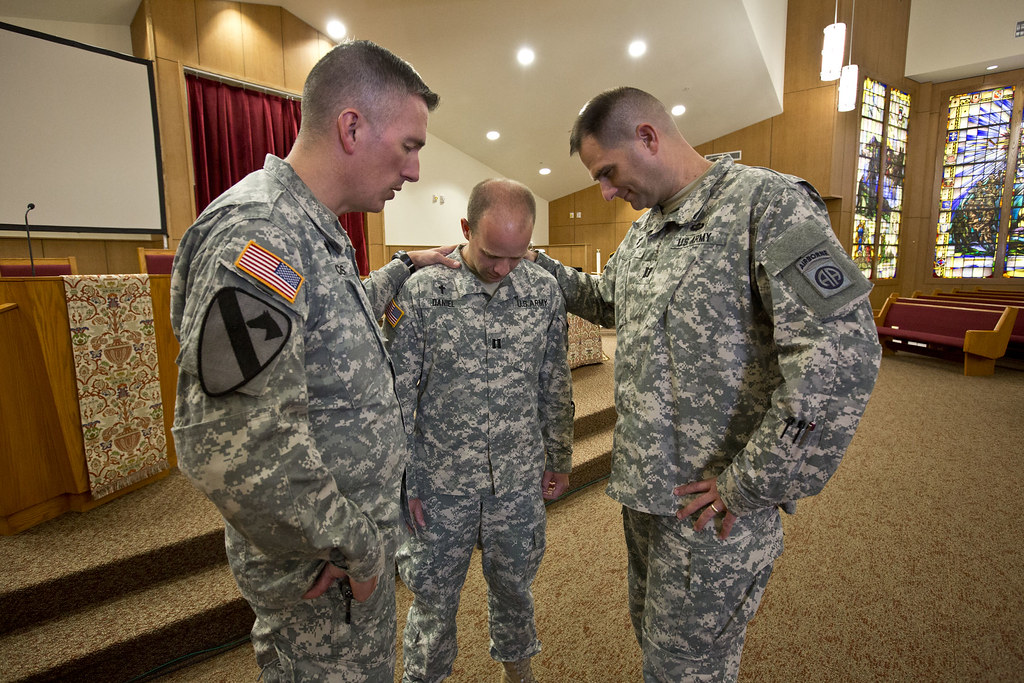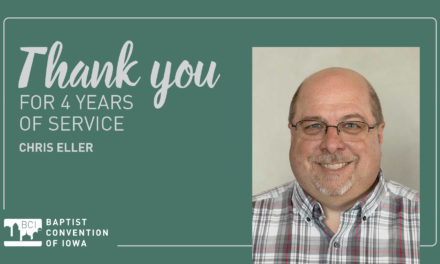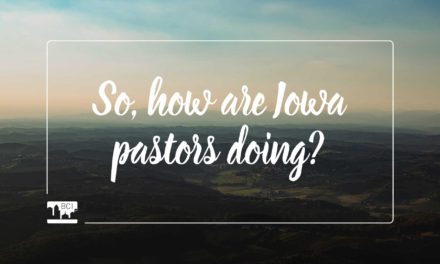SBC chaplains share Christ where local church can’t
By Tobin Perry
ALPHARETTA, Ga. – From foreign battlefields to American corporate board rooms to hospital bedsides to the front seats of police cars and more, Southern Baptists minister through their chaplains in some of the most hard-to-reach locations of North America.
“Southern Baptists have continued to see the need to send chaplains to places where the church may not have access,” said Doug Carver, the North American Mission Board’s executive director for Southern Baptist chaplaincy and retired chief of chaplains for the U.S. Army. “They provide the ministry of presence, provide the good news of Jesus Christ, opportunities to evangelize and witness—and sustain the faith of Southern Baptists who are in those places.”

U.S. Army Maj. Timothy Cross (left) Battalion Chaplain, 2nd Lt. Todd Daniel and Chaplain Cpt. Barry “Hoot” Busby (right), pray in the chapel at Fort Bragg, N.C., home of the 82nd Airborne Division. Military chaplains have responsibility to their commanding officers to provide advice, not only on the spiritual welfare of their troops, but of the spiritual temperament in their areas of operation.
NAMB photo by Ted Wilcox
Carver notes that Southern Baptist chaplains—serving in military, institutional, counseling, disaster relief, corporate and public safety roles—extend the evangelistic reach of SBC churches throughout North America and around the world.
Chaplaincy is one of six areas of focus for NAMB’s evangelism group. He says while evangelism at times happens differently in the military and organizational contexts where chaplains serve, sharing the gospel of Jesus Christ is a critical part of any chaplain’s ministry environment. In 2013 SBC chaplains presented the gospel to over 125,000 people and baptized more than 3,700.
“When chaplains preach during our worship services here on post at our Protestant services, they have the freedom to preach a powerful evangelistic message,” said Col. Jeff Houston, the installation chaplain at Fort Campbell, Ky. “We regularly baptize folks who have come to trust Jesus Christ as their personal Savior.”
Often the critical places and times when chaplains serve provide open doors for ministry that aren’t available to the local church.
“When we walk into the room of someone who is not a Christian, our approach is to provide pastoral care,” said Jim Wright, a Southern Baptist chaplain serving as the director of pastoral care at Baptist Hospital in Paducah, Ky. “But eventually the missionary aspect will come out. We’ve had many opportunities to lead people to Christ.”
Carver notes that NAMB’s chaplaincy team is focused on four main areas over the next year. First, NAMB will focus on providing care, support and appreciation for chaplains on the field. Carver noted that when chaplains are fulfilling their pastoral roles, they’re often doing so in some of the most difficult circumstances.
“It’s those critical, and often tragic, moments of life that chaplains provide an invaluable ministry of the presence of God to those seeking peace, comfort, and hope in a particular life situation. Obviously,” he added, “when our chaplains are engaged in that demanding and emotionally draining role, they need pastoral care themselves.”
Carver says embracing chaplains will mean giving them more frequent opportunities to share their stories in SBC churches. He also says his team is working on a strategy to help re-engage chaplains in the ministries of local churches once their chaplaincy ministry concludes.
Second, NAMB’s chaplaincy team will continue to educate churches on the ministry of all of its chaplains and about their own opportunities to serve the military. As part of that effort, NAMB has produced a toolkit (http://www.namb.net/Honoring-Military-Service_Members-and-Chaplains/) to help churches honor and appreciate chaplains in their midst. NAMB is also encouraging churches to adopt chaplains.
“Often, our churches don’t realize that they have chaplains and veterans in their midst,” Carver said. “We want to increase the awareness so that chaplains can help local churches in their evangelistic efforts.”
NAMB will continue to come alongside of churches and help them reach out to the military community among their members and around them.
“Just because of the way God works, those serving in the military are often searching spiritually,” said Gary Sanders, the founder and president of Military Missions Network and the pastor of military missions at First Baptist Church of Norfolk, Va. “It is a tremendous opportunity to share the love of Christ with them because they are looking for relationships, they are looking for stability, they are looking for hope. And of course all of those things can be found in God through Jesus Christ.”
Sanders’ own ministry at FBC Norfolk is an example of this. Among other service opportunities, FBC Norfolk provides their building and childcare for military Family Readiness Groups.
“Just by serving the military that opens all kinds of doors of getting to know them and to get into conversations with them about Christ,” Sanders said. “We serve them in word and deed.”
Third, Carver and his team are developing a strategy to help pastors and denominational leaders incorporate chaplains into their ministry plans. Often, Carver says, chaplains have ministry expertise that can help in other efforts, but those planning the efforts don’t know of their availability.
Fourth, NAMB chaplaincy is working toward a long-term strategy of developing a church plant ministry near every U.S. military base in the world. At this point, Carver says, NAMB is in the process of talking with leaders in each North American region about what it would take to increase military ministry around U.S. bases.
NAMB recently made the strategic move to appoint a military church planting catalyst to help foster church plants to better serve members of the military and their families. U.S. Marine Reserve Captain Endel Lee accepted the position in January. Lee brings a 33-year career as a reservist, 20 as a chaplain to the work. Lee has also served as the national Southern Baptist Disaster Relief chaplaincy coordinator since 2006.
Carver notes that, although there are strong military-focused churches and Christian organizations already supporting many of these bases, there aren’t nearly enough to properly reach these military communities with the gospel.
For more information about NAMB chaplaincy, visit http://www.namb.net/chaplaincy. Listen to a podcast to discover more about chaplain ministry.
Tobin Perry writes for the North American Mission Board.








